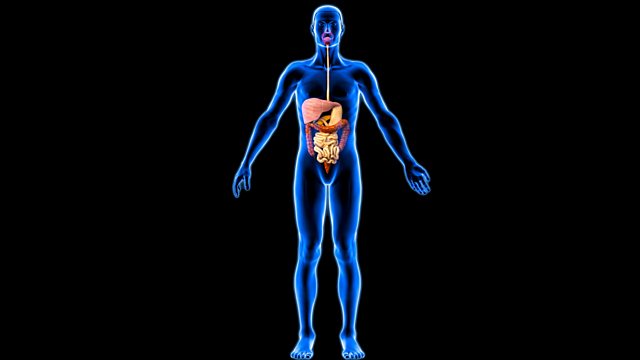
Sex of Organs
Sex of organs; PARO the therapeutic robot; Cockroach-inspired robot; High or Low Fat Diet?; Electric Eels and the battery; Food-associated calling in gorillas
The stem cells that make up our organs ‘know’ whether they are ‘male’ or ‘female’, and that this sexual identity could influence how they grow and behave. Dr Irene Miguel-Aliaga, Head of the Gut Signalling and Metabolism Group at the MRC Clinical Sciences Centre, wanted to ask a very basic question: whether it is just the cells of the sex organs of a fully developed organism that ‘know’ their sexual identity, or whether this is true of cells in other organs too - and whether that matters. It was previously thought that non-reproductive organs are the same in both sexes, and function differently because of the differences in circulating hormones, but this new research suggests otherwise. Adam Rutherford finds out more.
PARO the Therapeutic Robot
PARO the seal-like robot is on trial in a hospital and dementia day centre in New Zealand as a comforter for elderly residents. Simon Morton visits a home and talks to some of the residents, carers and a health psychologist from the University of Auckland.
Cockroaches Inspire Search and Rescue Robot
Cockroaches are not the most popular of insects and most people prefer not seeing them scuttling around their homes. However, the way they scuttle makes them extremely interesting for science. Researchers at Berkeley University have been studying the way cockroaches run, jump, crawl and slither for decades and found that the bugs can run at speeds 50 times their body length per second. New research now shows how American cockroaches manage to compress their bodies and squeeze through horizontal crevices that are a fraction of their usual standing height. Professor Robert Full tells Jack Stewart how a soft-bodied, legged robot inspired by the creepy-crawlies might help locate earthquake survivors trapped in rubble.
High or Low Fat Diet?
The advice to cut fat has been used by health bodies for decades, but was the message to reduce fat oversimplified in a drive to get us to eat less saturated fat? Fat now seems to be making something of a comeback with some arguing that a high carbohydrate diet is actually what is causing our obesity epidemic, a major contributor to heart disease and the driving force behind insulin resistance and diabetes. However are we simply trading one form of blame for another? James Gallagher has been investigating.
Electric Eels and the Battery
Naomi Alderman presents an alternate history of electricity. This is not a story of power stations, motors and wires. It is a story of how the electric eel and its cousin the torpedo fish, led to the invention of the first battery; and how, in time, the shocking properties of these slippery creatures gave birth to modern neuroscience. Our fascination with electric fish and their ability to deliver an almighty shock - enough to kill a horse – goes back to ancient times. And when Alessandro Volta invented the first battery in 1800, the electric eel was a vital source of inspiration. In inventing the battery, Volta claimed to have disproved the idea of ‘animal electricity’ but 200 years later, scientists studying our brains revealed that it is thanks to the electricity in our nerve cells that we are able to move, think and feel. So, it seems, an idea that was pushed out of science and into fiction, when Mary Shelley invented Frankenstein, is now alive and well and delivering insight once again into what it means to be alive.
Food-Associated Calling in Gorillas
Talking with your mouth full is an unattractive trait, but for other, non-human, great apes, it is an normal part of meal time. The noises recorded by a team at the Max Planck Institute for Ornithology are from the silverback Western lowland Gorilla. Primatologist Eva Luef explains to Adam Rutherford that this humming and singing during meal time is a way of signalling without wasting valuable eating time.
(Image caption: Artwork of the human digestive system (male) © Science Photo Library)
The Science Hour was presented by Gareth Mitchell with comments from ���˿��� Science reporter Jonathan Webb
Producer: Fiona Roberts
Last on
More episodes
Broadcasts
- Sat 27 Feb 2016 09:06GMT���˿��� World Service Australasia
- Sat 27 Feb 2016 23:06GMT���˿��� World Service except News Internet
- Sun 28 Feb 2016 02:06GMT���˿��� World Service Australasia
- Sun 28 Feb 2016 11:06GMT���˿��� World Service except Australasia, East and Southern Africa, News Internet & West and Central Africa
- Sun 28 Feb 2016 14:06GMT���˿��� World Service Australasia
- Mon 29 Feb 2016 06:06GMT���˿��� World Service South Asia
Podcast
-
![]()
Unexpected Elements
The news you know, the science you don't

